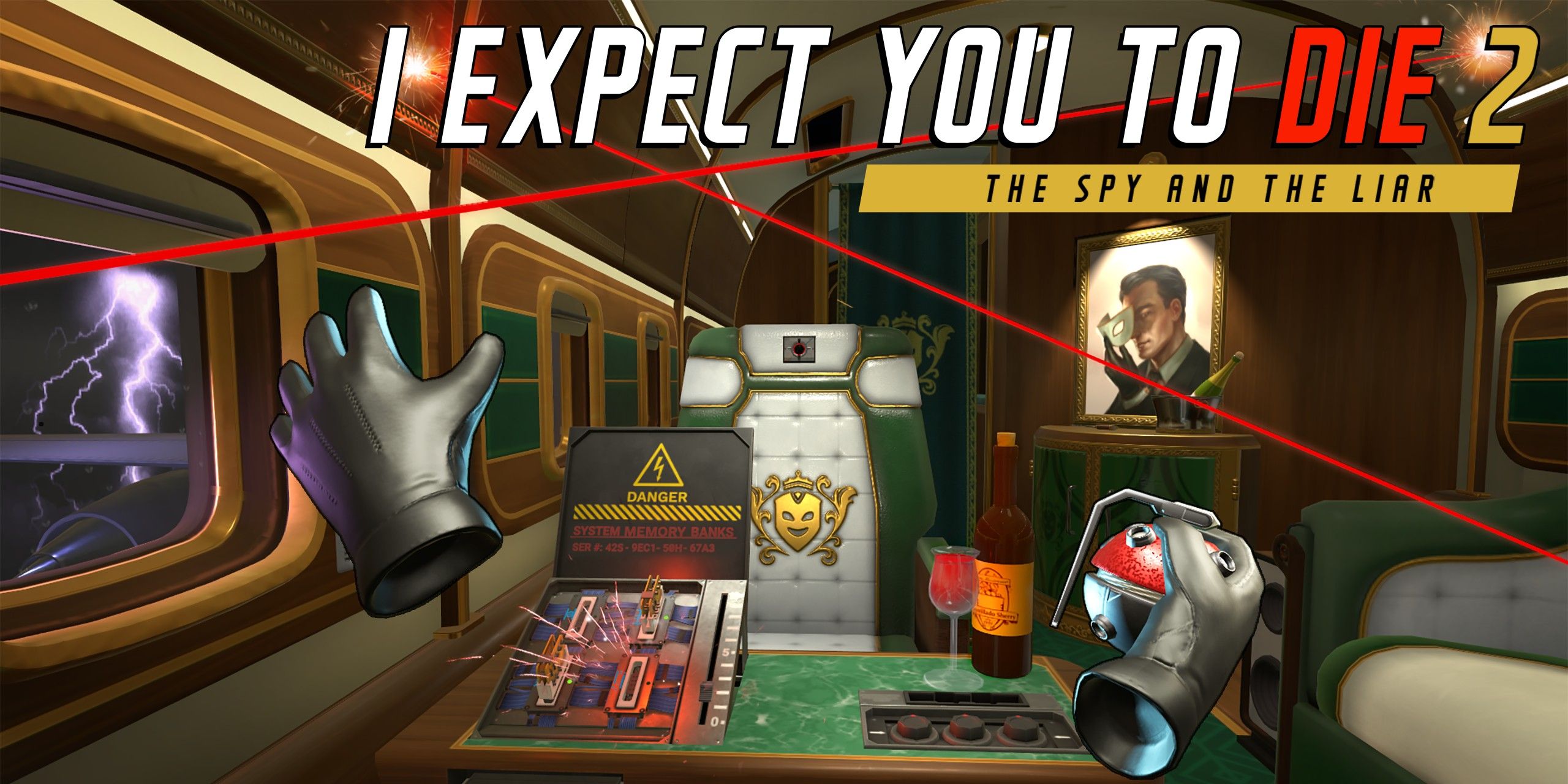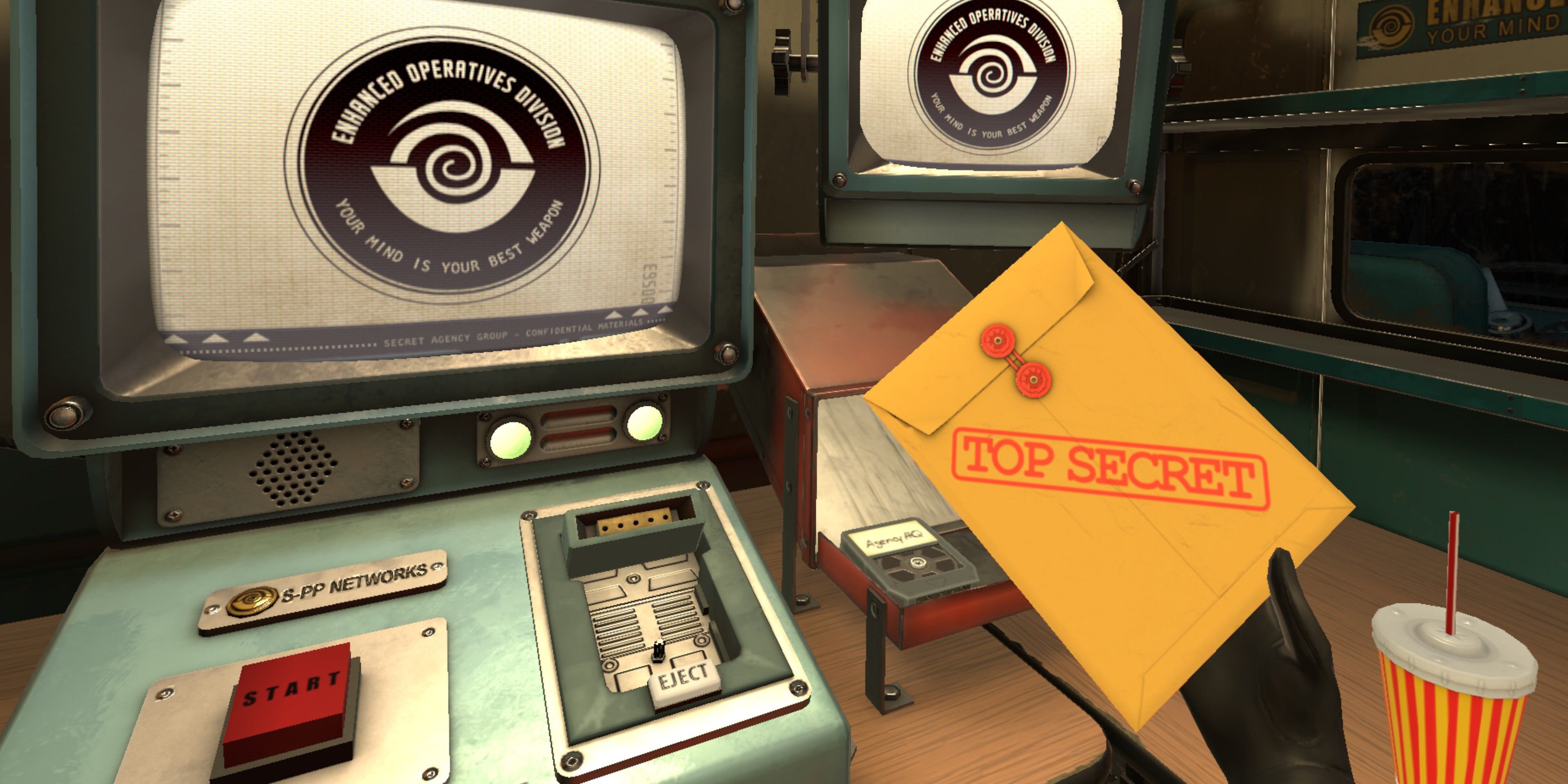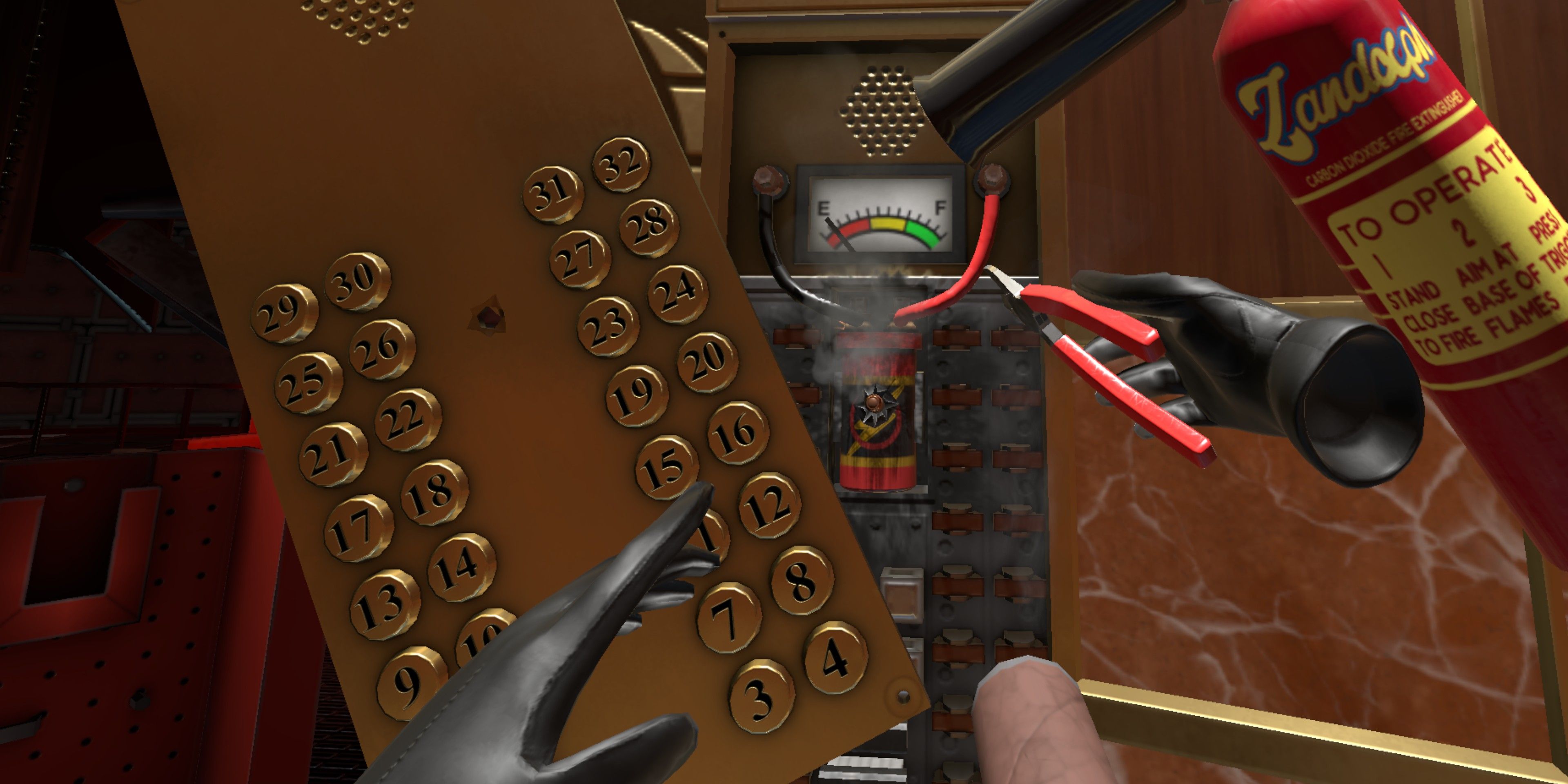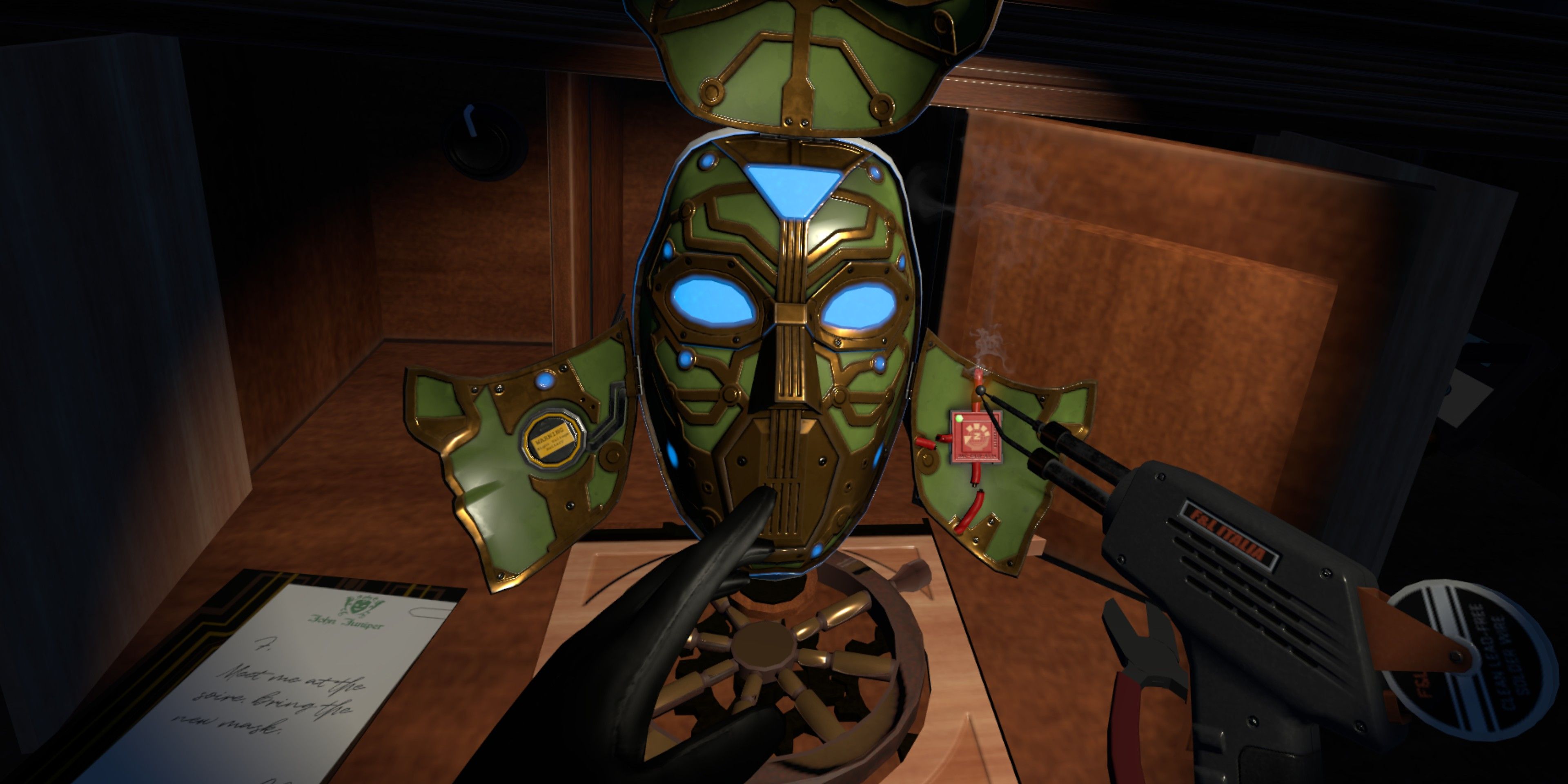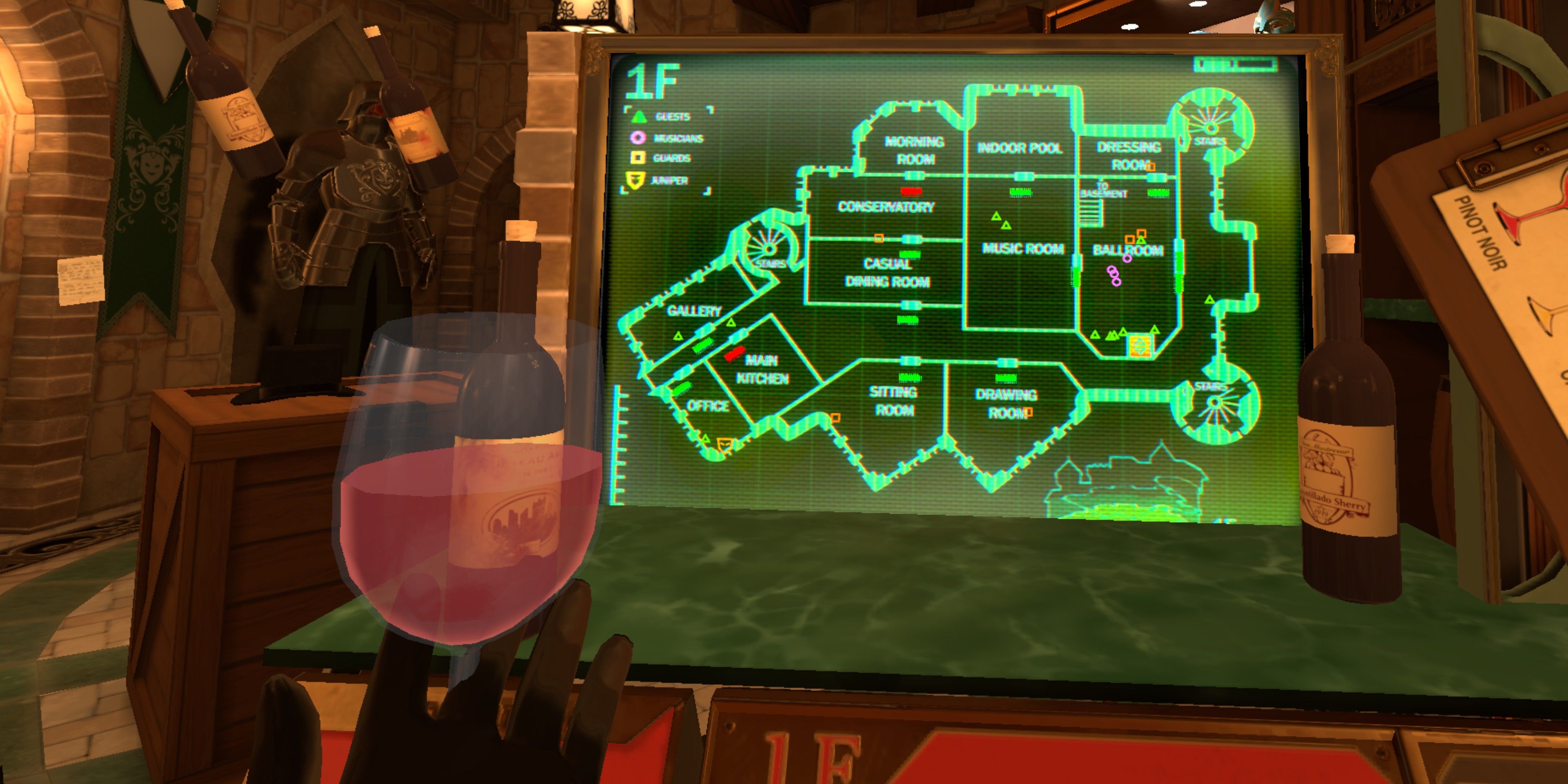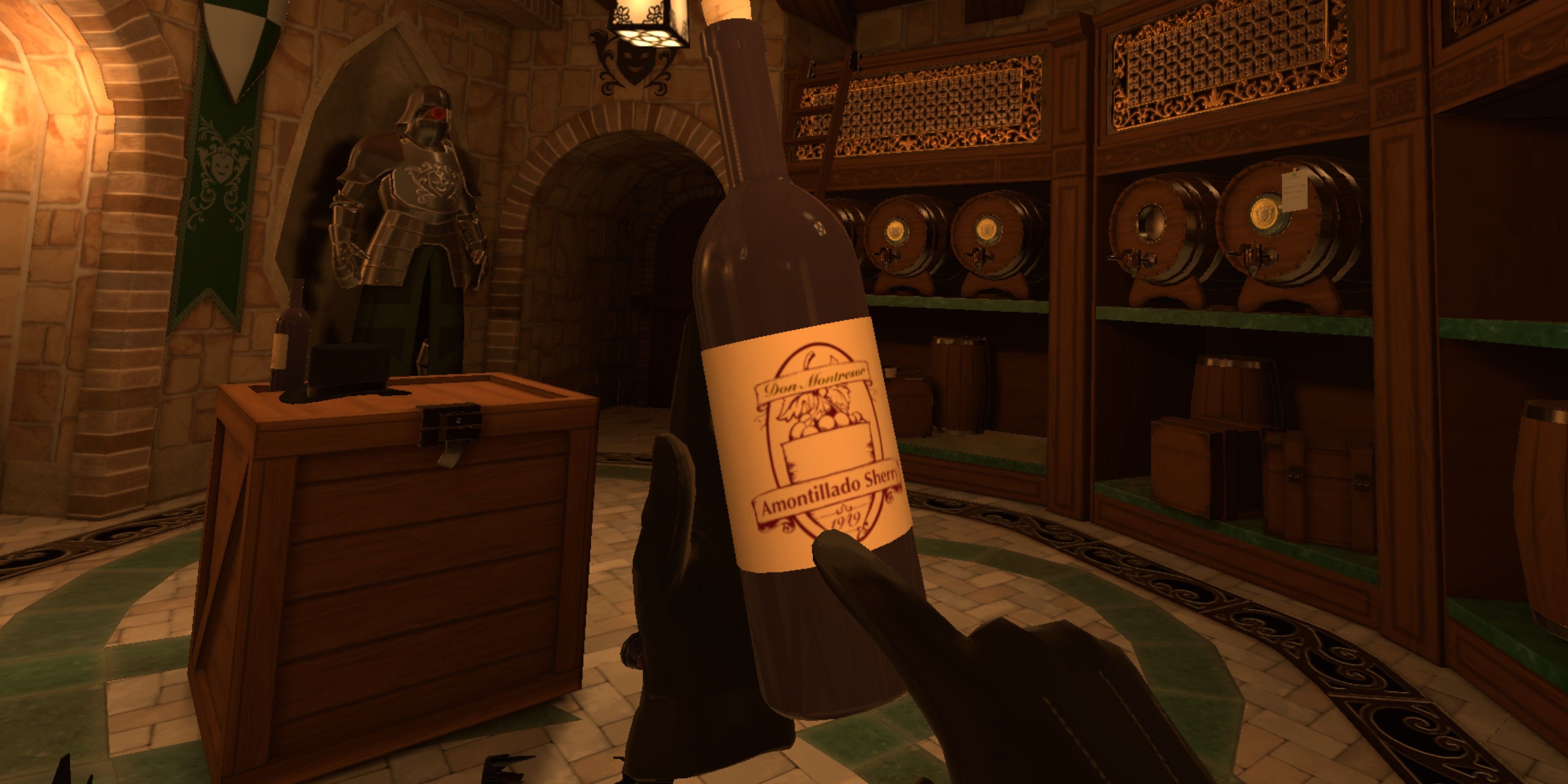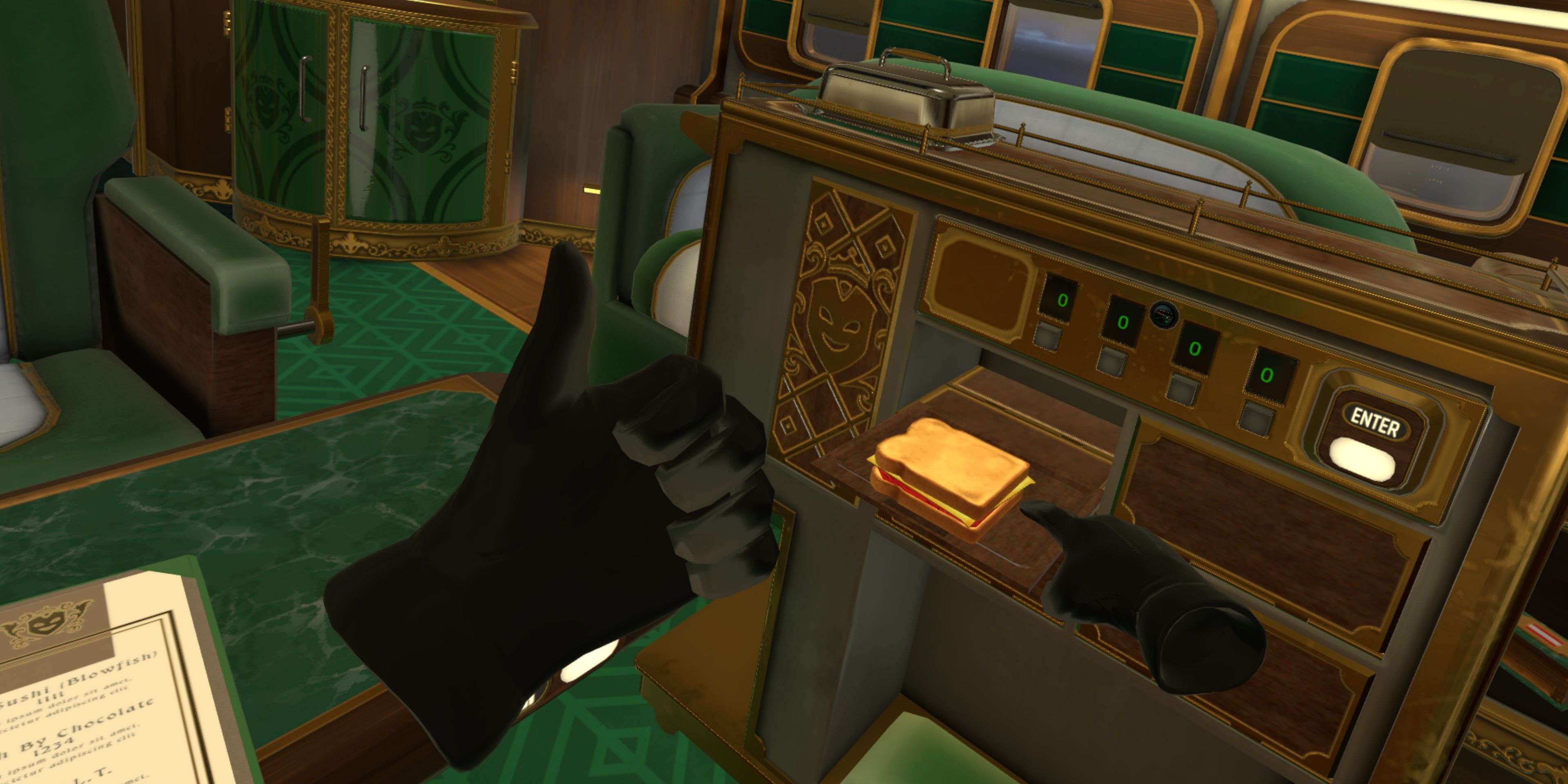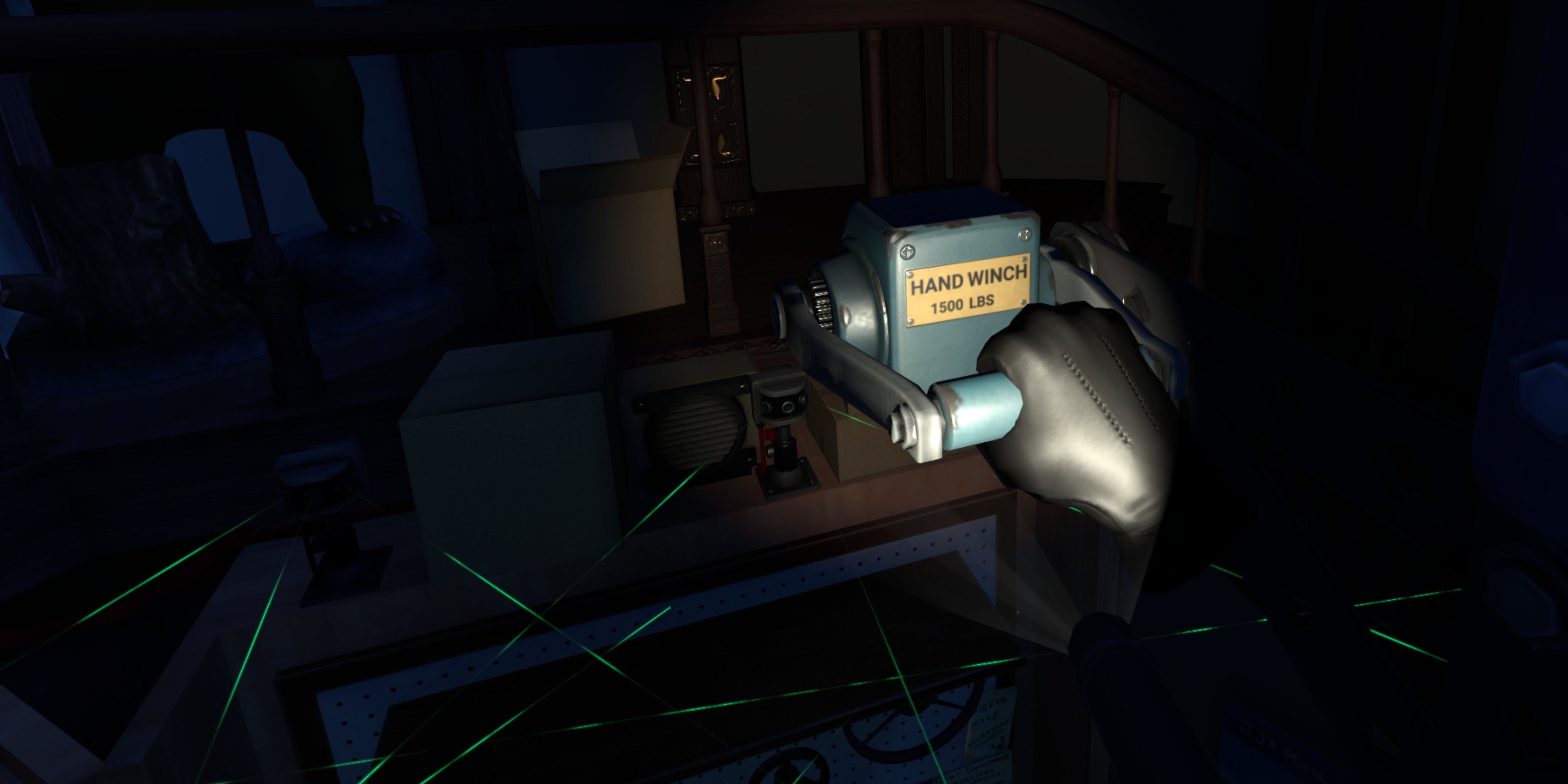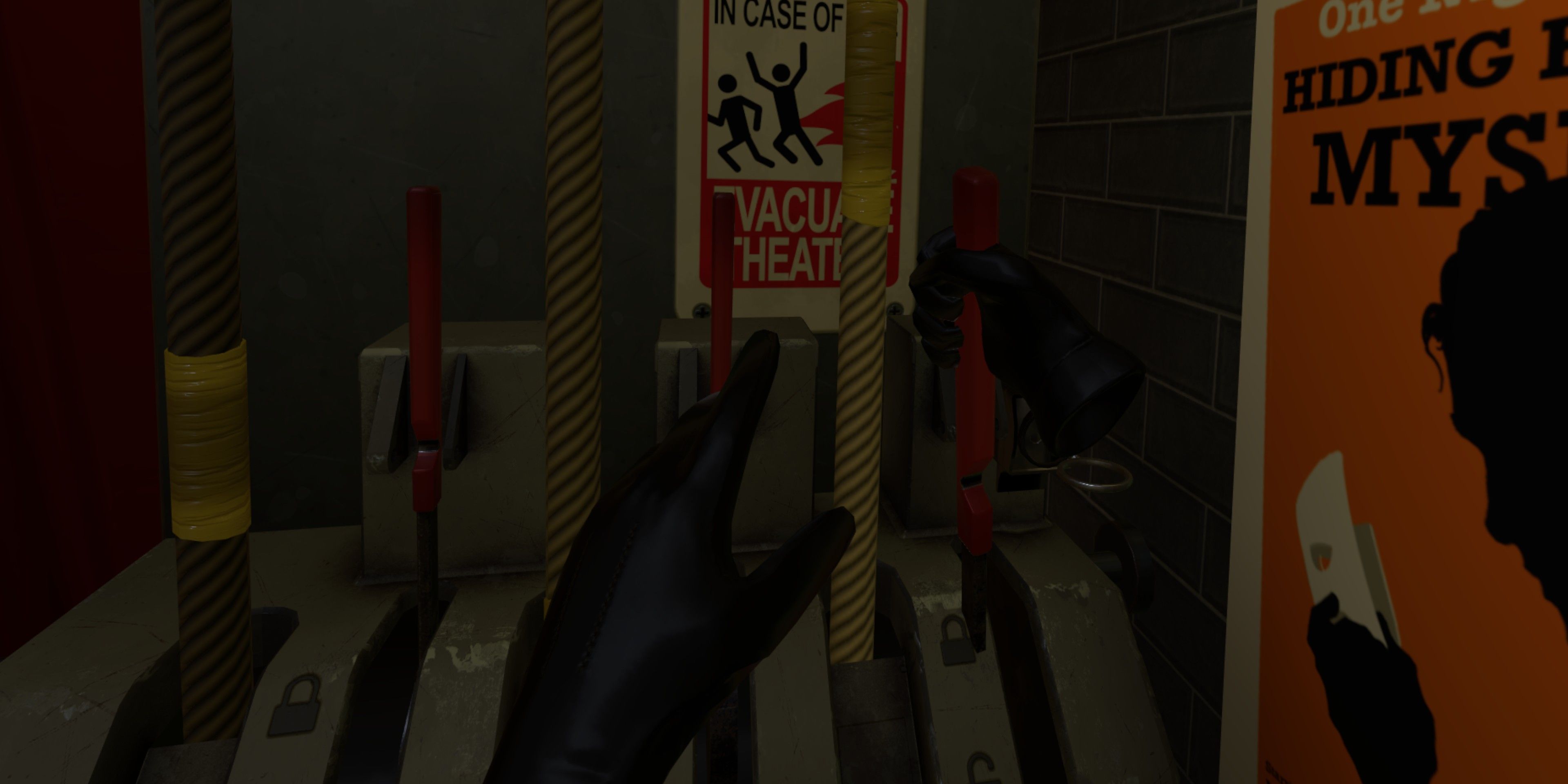I Expect You To Die 2 invites players to assume the role of a daring secret agent, complete with all the standard dapper accoutrements and complex gadgets; it just doesn't expect them to be any good at it. The VR game gives players the controls to solve puzzles and complete spy missions using a unique set of telekinetic powers. Along the way, players can mess with the game by offering up silly solutions or ignoring commands, leading to countless deaths. The end result is a truly immersive puzzle game bathed in comedy and intrigue.
Jesse Schell, Founder and CEO of Schell Games, discussed his upcoming game I Expect You To Die 2, including the origins of the bumbling spy premise and importance of the VR format. He was joined by voice actor Wil Wheaton, who described the process of bringing main character John Juniper to life during a pandemic.
CBR: Can you tell us a little about the aesthetics of I Expect You To Die 2 and its 1960's spy themes?
Jesse Schell: I Expect You To Die 2 builds a lot on what works well in I Expect You To Die, the original, the whole idea being that you are a super spy in that you have super telekinetic powers, but on the other hand, you don't exactly know what you're doing. So a lot of what's fun about the I Expect You To Die world is we really kind of riff off of this sort of 50s/60s spy-fi styling, which makes for a lot of really fun settings and artwork and situations. It's a really fun place to kind of play around in. There's just so much to explore in it.
Are you a fan of the spy genre in general?
Schell: I mean, spy stories are always super fun, right? You've got the whole business of sneaking around, you've got all these crazy gadgets, you've got villains with weird motivations. You look at stuff that is sort of serious, like, say, James Bond, and everything is kind of cartoony -- it's sort of serious, but sort of silly. And we decided, like, "Hey, let's really play that up" and leaned into the real craziness and the real silliness and the real over-the-top quality that you can have with super villains, as well as with spy gadgets. The whole idea of an incompetent spy is a really funny one, because the spy's doing things in secret. So if you don't know what you're doing as a spy, nobody knows.
You can sort of fail in silence.
Yeah, that's right.
So how does the era help with that secret agent identity? Why were the 60s the 50s important for this story?
Schell: It's a good question. Why is it that that is such an ongoing trope? I think part of it is rooted in James Bond, because that's kind of when James Bond came to fruition. But there's something more to it; there's something about just that period and the idea of the mechanical gadgets of that period. Honestly, I have a little trouble putting my finger exactly on it. I think there's something magical about there aren't computers yet, but we're gonna have these kind of magical gadgets that do interesting things. It lets us have a lot of fun with this kind of retro field but still do really cool, interesting stuff.
Why was it important to tell the story of I Expect You to Die 2 in VR?
Schell: The way I Expect You To Die first came about is through an argument we were having about whether VR was something worth doing. That was How I Expect You To Die started because some of us were very, very excited about VR, and other people were like, "No, VR is a huge problem." We were arguing about the locomotion problem where, when you move around in the world, you can get motion sickness if you don't do it right. And someone was saying, "See, that's the problem. You put on the headset, you want to feel like a superhero, but you're tied to a chair -- what kind of superhero gets tied to a chair?" And we all looked at each other like, "Oh, that happens all the time." Right? But nobody ever made a game about that.
We realized like, "Wow, what if we made a game where that's the whole thing? Where you're kind of trapped in this place and you can't move but you're gonna use your cleverness in order to puzzle your way out of the situation?" That's where the title I Expect You To Die comes from. So that works really well in VR, because traditional video games are all about running around -- you're just running, running, running, running, running everywhere all the time, you're just constantly running in and covering ground and covering ground. But in VR, running isn't a great experience. What is a great experience is manipulating objects up close to you with your hands.That's a thing regular video games are very weak at; it's a very bad experience in normal video games to manipulate objects. That's what makes I Expect You To Die so strong is it's all about manipulating objects around you in interesting ways in order to figure out how to solve puzzles.
A big part of that is when we make these games, we watch what people do, and then we watch what they're trying to do. When we see someone try and do something and the game doesn't support it, and you see that little moment of disappointment, we say, "Okay, let's go back and put that in." This often will lead to like a big cascading chain, right? Like, "Oh, someone wants to celebrate, we'll put a champagne bottle in here. That's kind of fun." And they're like, "Oh, great. I have a champagne bottle, I should be able to open it." And we're like, "Oh, you should... we'll put a cork in it." "I should be able to pour out the liquid." "Oh, I guess we should put in liquid." Okay, so now we support liquid. And they're like, "Wow, great. That's fine. I poured it out and I drank it and all that -- now I've got an empty bottle, let me try breaking it." And, "Oh, it should be able to break." "Okay, it broke. Now I've got broken glass, can I use the glass to cut a rope?" Like, "Oh, you should."
You just keep going and going and going, you keep going down, down, down, down the chain with that. And when you do that, you end up with a world where people go in and they feel like, "Wow, anything I try, that kind of worked." That's where you get the real power from it. When you take the trouble to do that, the kind of escape room experience in VR, it's just really fun.
That sort of cascading that you described there not only creates a fun game for the player, but it must create an amazing amount of work for you and your team.
Schell: There's a reason years go by between us making a sequel. It's because it takes a long time to do it well and get it right. It's fun work, but you have to be very patient. You come up with ideas and you try them and change them and you change them and you change them. You layer them and you layer and you layer and you improve and improve and improve. One of the big changes we did with the sequel, with I Expect You To Die 2, is we saw people had a lot of appetite for story moments. So we've leaned in and said, "Okay, how can we have a better story arc and do more fun things with the characters and more sort of story surprises as we move through the the series of missions." So that's been really fun.
What sort of changes did you have to make to incorporate more of those story moments?
Schell: It required a lot more planning. Whereas in the previous game, we were very much designing the missions one at a time. "All right, let's figure out a submarine mission, how would that work? Let's figure out a mission on a train, how would that work?" And the connections between them were kind of tenuous and very, very last minute. It would be near the end, like, "Hey, wait, we can connect this in this." Whereas in this, we kind of came in early like, "Yeah, let's figure out cool scenes. But let's also figure out how to weave them together into an unfolding story. That'll be fun for the player to to uncover."
It's been incredibly fun to work on because it's been sort of an annealing process of the puzzles and the story coming together and realizing, "Oh, wait a minute, if we're doing that with the puzzle, we can have that in the story. If we're doing that in the story, we can also have this other puzzle and that means we can do this other part of the story."
The two things really came together very nicely and a lot of it surrounded performances. Wil Wheaton playing the John Juniper character just lends a lot of fun with it. We brought him in early and started trying to talk about John Juniper and what he's like and what he's all about. Wil gradually found a character for him that really just made him fun to interact with. So we have a lot more moments where you are interacting in this kind of back and forth with characters and voiceover in the game, which has been super fun.
It's hard not to notice that the the character that Wil plays is an actor himself. How much of John Juniper is based off of him?
Schell: Honestly, the reason that we had initially pursued him was we were talking about the idea of like, "What if we had a main character here who was an actor? And who would be good for that?" We'd started talking about Wil as just like, "Oh, wouldn't it be funny if we got Wil Wheaton?" And then we're like, "Oh, that would be more than funny, that'd actually be a really good choice. Let's see if we can make that happen." We reached out and there was interest, so we started talking about it. From really early on, we sort of formed the character around Wil, really.
Have you noticed any changes in how you, as a developer, interact with the VR format over the years or how players are interacting with VR at all?
Schell: Well, we're certainly seeing that VR is just getting more and more momentum every day, particularly the Oculus Quest platform is just growing by leaps and bounds. The number of people playing and the frequency at which they play, it's gotten really huge. In the early days, we really had to be very gentle about bringing people into VR. We had to assume this might be your first VR experience you've ever done and maybe you don't really understand what it is. Whereas now people come in with a lot more experience, so we don't have to treat them with such kid gloves in the very beginning, we can kind of put them right into situations a little faster. So that part's really nice, that people are coming in more VR-ready.
Are there any big changes you wish would happen to the format for maybe I Expect You To Die 3, the next sequel that comes out?
Schell: We're talking about all kinds of things. We actually have a team that focuses entirely on sort of experimental new ideas for I Expect You To Die. So we have a lot of things that we're talking about for the future. But when the game launches, there's already a lot of things in there that are new, that we have never done before that we're really thrilled to put in there. We have more and more ideas for things that we hope we might be able to do in the future.
What is the sort of intended relationship to the player that you hope I Expect You To Die 2 has?
Schell: We know that you're going into this and you don't know about this world, you're not really a secret agent, but we're kind of asking you to be one. So by embracing the idea that you're kind of a bumbling, secret agent who ends up dying over and over again, you get some instant comedy out of that. One of the things people don't think about enough is that comedy really can help a VR world. Because VR is all about immersing yourself in a world and having it feel real, if the world's very serious, if something silly happens by accident, it kind of breaks the world and you're like, "Oh, that's not really happening." It kind of takes you out of it for a second. But if the world's already a little silly and then something silly happens, it just makes the world stronger.
So comedy has this unexpected effect, right? And you have to be careful because when you make the player the butt of the jokes, which is going to happen -- you're like, "Oh, I'm gonna pick up this ash tray, what does it do?" and it explodes on you -- you have to be careful not to humiliate the player. You want to be there with them. You want to make them part of the joke too.
And so a lot of it has been getting the writing right, so that it turns out you're not the only incompetent one. The agency you're working for, they seem to have some questionable policies that are a little bit ridiculous. And the villains that you're encountering? Wow, they have some kind of strange weaknesses, and really eccentric peculiarities.
On one level, it's like you're the competent spy, but then, wow, everybody is being incompetent in different ways. That just sort of ends up creating this entire world and this entire relationship where you don't feel like you're the loser here. You feel like, "Okay, actually, I don't know what I'm doing and that makes me fit in to this world," if that makes sense.
I love that idea that comedy can help with a VR-style game. Ultimately, then, what genre would I Expect You To Die 2 fall under?
Schell: I think that if we want to call it a genre, I would say a VR escape room would be probably the right way to put it, because that's what you're doing. You're in a series of situations where you have to figure out, "How am I going to get through this? How am I going to survive this tricky situation?"
How has the pandemic impacted both your development and the overall creation of I Expect You To Die 2?
Schell: Oof, yeah, the pandemic definitely slowed things down and made things harder. Certainly the way we normally play test where we bring people in and we kind of sit with them and we take notes and we ask them questions and all of that, we couldn't do that. We had to find ways to take all of that online, which really slowed things down. It slowed things down also just having to do everything virtually, because normally we don't necessarily have a VR headset at everybody's desk. But if everyone's gonna be at home, everybody better have one because you're not gonna be able to go in and share one. So there are a lot of obstacles.
But I think in real credit to our production team, when we saw what was happening, we made adjustments and we made changes. We were able to kind of get everything done that we wanted and we were able to get it all done on time and really, really high quality. What we've seen is, I think the pandemic has helped somewhat with VR sales, because there were a lot of people who were like, "Wow, I'm so sick of being in my apartment all the time, I wish I could get into a bigger space." And VR is a way to do that, to kind of a mix up your day without necessarily having to go outside if that's not convenient that day. So a lot of people tried VR because of the pandemic.
I think one of the things that is going to happen as we come out of the pandemic is I think we're gonna see a secondary boom of VR. Because, particularly with the Quest where it's really easy to take it to a friend's house and show it to them, that hasn't been happening. The last thing you want to do is take a headset, rub it all over your face and get your friend to rub it all over their face, that isn't really where people have been lately. But people are going to start to get more comfortable with like, "Hey, I can share this with you now." So we've had all this kind of nascent VR growth happening independently and I think we're gonna see a lot of sharing start to happen in the next year or two.
One of the real interesting things with the new game also is we're trying to give it more of an international flavor. So that was fun, to be able to have these international settings a little bit. But there's some challenge to it in that you want to be careful when you do that. You don't want to, I don't know, misrepresent a particular culture or anything. I think when people play the game, I think the way that we did that, I think people will... I don't know, I just think it's really fun. We found a way to kind of make this sort of alternate universe of nations that feels realistic, feels authentic, also feels very 60's. That's just a thing that we did, I just feel good about that. We found such great voice actors, it's such a good collection of voice actors, even for these little -- some of the roles were small. It's just I'm really pleased.
Wil, what drew you to the character of John Juniper?
Wil Wheaton: So years ago, I mean, like 10 or 12 years ago, I worked with Khris Brown on a game called Brutal Legend. And we had so much fun working together, that I put her on a list of people who I will always say yes to -- much to the chagrin of my team who's like, "You can't work for free," and I was like, "Yeah, but I'm going to work with Khris 'cause she's amazing." I've just had the incredible privilege to be directed by her a number of times since then. So when she got in touch and said, "We're working on a game." I was like, "Great, I'm in; I don't need to know anything else. Just tell me when to show up and I'll do it." It was awfully fun.
The way that it used to work, you'd get the script for the game and you would know what was going to go on, you'd know who you're playing, you'd know all the twists and turns and all of that stuff. Sometime in the last decade or so, producers have stopped doing that. Now studios are like, "We're just not going to tell you anything about this game because we're so paranoid about secrets getting out. Good luck, I sure hope your performance works in isolation of everyone else."
One of the reasons I love working with Khris is she just makes sure that every thing that I do matches up with and fits in and slots in really nicely with the rest of the game. So as I started to learn a little bit about John Juniper -- he's great. As far as he's concerned, he's the smartest guy in the room. He's the most powerful person in the room. He's your friend -- as long as it suits him. It was just an incredibly good time bringing him to life.
Schell: Plus one to all that, certainly to Khris Brown as a director. She's been an incredible partner for us on this, that's certainly true. Being able to kind of have fun with this sort of ego-maniacal Hollywood actor who's trying to control everything -- not to say that we were typecasting, Wil, that's not what we're getting at here.
Wheaton: I can play that type of character really well. I have fun playing the character who is convinced he is the biggest presence in the room, in every room he goes into. It's just fun. In real life, that's not who I am. In real life, I cannot stand it when there is any attention on me at all. I want to disappear into the background. So as an actor and as a performer, I can really lean into the other side of that, which is, for John, "You're going to do everything that I want you to do, and you're going to do it exactly to my specifications. And everything's going to work out extremely well for me."
So what do you do to get in the mindset of a character who is maybe the opposite of who you are in real life?
Wheaton: I just honor the words, honor the text. Writers are really good at communicating to performers what they hope we will do with their words, and between Khris' direction and the word choices that were there in the script -- A writer is always telling you, "This is what I want, this is how I expect the story to go." My job really is to just find what the writer is looking for and then bring it out as clearly as I possibly can. You know, the fun part about a guy like this is that he's not a good guy. He's not your buddy. He has a lot of ulterior motives. So I know all of that, going into the VO sessions, and then I just lean on Khris to keep those performances truthful and faithful to what the writer's intention is.
Schell: We did the first session with you, Wil, and we sort of saw where you were taking the character. I think we had a little bit of a different initial idea of the character. I think we'd imagined him a little more, I don't know, a little more formal and a little more stiff. And then we saw where you were going with it, we're like, "Oh, this is much better." We ended up changing, as we were writing the newer parts, we ended up like, "Oh let's really embrace where Wil is going with this." The whole experience was just great, because then when we came back to do more recording, I felt like everything just kind of turned up a level because I think we were writing to the character that was natural to you a little more. It just felt great from our side.
Wheaton: I would give a lot of credit for that existing to Khris Brown because she really, really supported choices that I made. As we were recording it, more than once I would just have an idea, an inspiration. We would do a take and I more than once just asked Khris, "Hey, can I just try something?" I just want to try something that is outrageous, that's just the wrong choice. I want to do the biggest, craziest, weirdest, wrongest choice. Because generally, when I'm making those choices, there are little pieces that can be pulled out and reassembled into something. Working with someone like Khris, who I really trust, who I can really rely on, makes that kind of performance really possible.
What was the recording process like for I Expect You To Die 2? Did it differ much from some of the other voiceover work and podcast and audio narration work you do?
Wheaton: When we have worked together in the past, I have been able to go into studios. Khris comes down from Northern California and we work in a studio in Santa Monica, sometimes we work in a studio in Burbank. In the midst of a pandemic, that isn't the most responsible thing to do. So I actually worked from home on a bunch of jobs last year. It was a challenge, but it was real satisfying.
I got a few boxes of equipment delivered to my house and I set all the equipment up and then I built some sound baffles out of blankets and wardrobe racks and put them up in my bedroom -- the only room in my house that has a carpet in it -- and I sat on the edge of my bed. It was really cool. The session engineer VPNed into a laptop in my bedroom. They were running the session from I want to say San Francisco, but I could be mistaken -- but from somewhere very far away. They ran the session remotely and it was great. It was really easy. You certainly couldn't beat the commute. It was really fun.
I have a lot of friends that work in animation right now, and all of us have converted closets and extra bedrooms into VO booths so that we can work from home. My friends from Star Trek: Lower Decks, 100% of the season was recorded remotely; they were never together. It's just a way that we've all had to kind of learn how to work and I expect that it's going to become our new normal because it opens up a lot of work possibilities. It's just easier. It's faster. It's a really, really frictionless way to to get the work recorded.
Jesse, was you're at-home set-up also in a closet in your bedroom?
Schell: Ha, no. Ever since the pandemic I kind of moved down into my weird basement office here and have been doing things from there ever since then. I will say that whereas it used to be, when we would do sessions, we would either do them live in person or, a lot of times, it would be trying to help direct over the phone, but now that everyone has gotten much more comfortable with video conferencing, it has helped make it a lot easier to kind of do the right sessions and have the right people in there at the right time. You couldn't always get the writer in the session, for example, and to be able to kind of have the writer right there, to be working back and forth with performers, it really helps a lot. It lets you get more done flexibly -- when all the technology is working.
Wheaton: I really like being in the booth with other performers. I love when we are able to riff together and play together and inspire and challenge each other. I missed that working at home. I missed the camaraderie, I miss seeing my friends in person. But as far as the relationship with engineers and directors, there's always glass between us. So whether that is four inches of glass in the studio, or we're separated by 1000 miles, the end result is kind of the same.
What is your experience with VR games — are you an avid player, a fan of the format?
Wheaton: I mean, it's very little. I don't enjoy it. It makes me really nauseous. So far, in my experience, I have yet to stumble upon that thing that makes me go, "Oh, I love this." It's just not for me. But look, I'm 49 years old. I am super set in my ways. I have a really useless inner ear that causes all kinds of problems for me. So it is unlikely at this point in my life that I will be playing and experiencing VR.
All of that said, to be part of the creative team that brings a VR game, where the whole point of it is you're interacting with things that aren't actually there, the whole point of it is you are actually in an airplane, you're actually in a building, those sorts of things -- that's super cool. I love that. If it didn't make me as violently motion sick as it does, I would be super duper into it. So I'm not the greatest spokesperson for how awesome VR is. I absolutely love that it exists and I wish that I were able to to spend more time in it.
I love that you are so involved in this game and iffy on the the format itself.
Wheaton: I'll probably never get to play it. I mean, I could but then I would immediately segue into a violent vomiting hero. A game I'm extremely good at.
Jesse, did you plan for that type of character in your game? The vomiting hero?
Schell: That sounds like a perfect one for I Expect You To Die 3, I'm pretty sure. Perfect testing there.
Is VR integral for telling the story of I Expect You To Die 2?
Wheaton: Yes, yes, yes. Absolutely. The whole point of it, the fun of this game, the reason you play this game, is to interact with VR puzzles. The whole point of this game is to have your VR rig on and be in these imaginary environments, moving things around, manipulating different things, bringing things to life that just are not actually there. That is the whole point of this game. The VR experience, I think, is integral to that -- that's why you're playing this. If you enjoyed the first game, the humor is there and the meta is there. But the VR experience is going to be really special and really fun.
So I talked to Jesse a little bit about this before you joined, but what's your familiarity with the spy genre? Are you a big fan of spy movies and novels?
Wheaton: I don't know. I mean I guess my knowledge of the genre is fairly average? I know the Bond franchise real well -- I mean, I exist in the world and that's everywhere. I really love the TV show Leverage because I love heists; I think heists are terrific. I think about the great novel Fletch as kind of a great example of the genre where you think you know what's happening and something completely different is happening and you're along for the ride and don't really know what's going on. I absolutely love that.
I think when you're participating in the genre, narratively, you want to feel clever, you want to feel like you are figuring out ways to use these things that nobody could possibly have imagined. Then you get rewarded for it, and that's really, really fun. That's one of the things that I enjoy about the moustache-twirling Hank Scorpio villain, who sort of motivates the player and things like this. Because we all know who that character is. In this game, we're getting to push back against that and hopefully drive the story in ways that are really fun and satisfying.
Schell: I know for me when I was a kid, the spy stuff -- like, serious spy stuff -- that was okay. But I loved Inspector Clouseau and I loved Get Smart, kind of being able to spoof that genre. Those have been some good inspirations for us, as we put this together, to be able to have that kind of fun with it. Because, you know, in both of those, you got a bumbling guy who ends up saving the day. And to let everybody kind of have that experience is just fun.
Since I Expect You To Die 2 has so many escape room elements, what are your feeling on escape rooms -- are you big puzzle solvers?
Wheaton: So I haven't done one, but they are so unbelievably relevant to my interests. The closest I've come to escape rooms would be like the True Dungeon experience at Gen Con, which is more of a full-size walk-through Dungeons and Dragons-style adventure where you try to solve puzzles and successfully cast spells and successfully manipulate environments -- it's real similar to an escape room. I have really, really enjoyed it.
But you know, in the last year and a half as that's really become a thing that people do, I'm not in a big hurry to go be indoors with a bunch of strangers. So I haven't experienced it. I guess this is a terrific marketing opportunity for me to say if you enjoy escape rooms, I Expect You To Die 2 will scratch the hell out of that itch in a really fun, really satisfying and extremely safe way.
Jesse Are you are you big escape room fan?
Schell: You know, this is gonna sound crazy, I'm going to admit my secret, too: I have never actually done an escape room, although I have studied dozens of escape rooms. It just always ends up that because I know lots of people who make them, I help consult on them, etc. But like actually showing up, paying my money, doing a formal escape room -- I've never actually done that.
But I am a huge fan of the genre. Taking puzzles and making them real, there's something really fun about that. And that is a lot of what we really tried to do with the I Expect You To Die games is to take that same kind of fun, but then be able to take it up a level because we can do fantastic things. We can have lasers and missiles and jet planes that you couldn't have in a normal escape room. So we can kind of take that escape room fantasy up a level with virtual reality.
Aside from I Expect You To Die 2, what have you been playing recently -- video game or tabletop game or otherwise?
Wheaton: I am three seasons into career player mode in NHL 21. My character Homer Simpson is the starting left winger for the Los Angeles Kings. He was, I think, improperly promoted to captain over Anže Kopitar, which is embarrassing and puts a ton of pressure on him. But at the moment, the 2023 Los Angeles Kings are currently doing well in in their division. So I've been doing that.
Also I have a PlayStation Now subscription, so every couple of weeks I go through older indie games and I just look at things that I may have missed when they came out before. I just kind of dip into them and try them out. I wish I could remember the name of it, but I had a really fun time playing an outrageous miniature golf game a couple of nights ago -- really silly, terrific, really simple gameplay.
It's interesting the older I get, the more I want my games to be more casual. I really want to be able to pick them up and put them down. I rage-quit a couple of AAA titles in the last couple of years because they didn't satisfy that for me. They became sort of about those boss battles and stuff. My son loves the really complicated, really unforgiving games like Dark Souls and I just hate them. I don't have any fun with them at all. I feel like I'm taking a test, and it is not fun for me at all.
And finally, I will always always go back to Red Dead Redemption II. I've played through the story three times. I don't play online -- I want all griefers to die in a fire, you have ruined online gaming you awful despicable people. But for giant open world games where it's just like, "Yeah, I'm just gonna go ride my horse for an hour" -- boy, is that satisfying. Boy, do I love that. It's just great.
Jesse, have you been playing anything?
Schell: Oh, boy. Lately, I've had to spend a lot of time just playing my own games just to keep up because we've got so much going on at the studio. But I also am playing an unusual game Sakura: Of Rice and Ruin, which is a super weird idea for a game. It is kind of a platform game where you do a lot of fighting on these platforms and then you go and collect a bunch of resources and you take them back to the most detailed rice farming simulation anyone has ever seen. You use your resources to make all these kinds of fertilizer for your rice farm and then you go through the 27-step process of rice farming while you feed this family that helps you -- it's just super weird. I love super weird games that shouldn't exist and this is definitely one of those and so that's super fun.
I Expect You To Die 2 is developed and published by Schell Games and will be released Aug. 24 for the Oculus Quest, Oculus Rift, Play Station VR and Steam VR.

